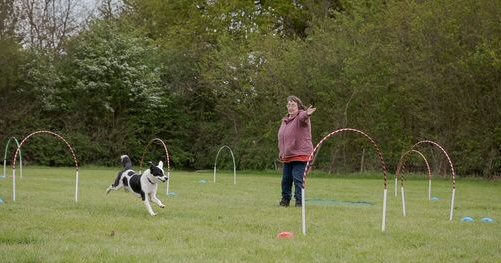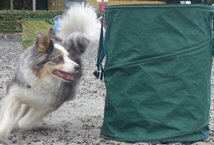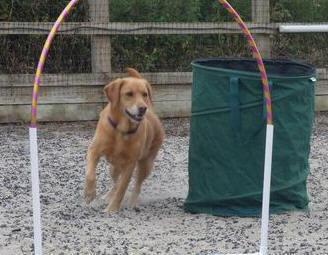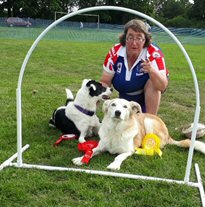It's not rocket science...
 By now most of the agility community
will have heard of a comparatively new sport called Hoopers. Recently Hooperholics UK founder
and lead
instructor Angela Lucas took a look back her
early efforts, and she really had a laugh. Compared to how she now approaches
training and handles her dog, she thought that she looked like a
banshee! Her words, not ours. And that was only four years ago! By now most of the agility community
will have heard of a comparatively new sport called Hoopers. Recently Hooperholics UK founder
and lead
instructor Angela Lucas took a look back her
early efforts, and she really had a laugh. Compared to how she now approaches
training and handles her dog, she thought that she looked like a
banshee! Her words, not ours. And that was only four years ago!
Hooperholics was a term I
coined when I got hooked on Hoopers. Right from the start, I just loved it
especially as it could
genuinely be done by each and every dog. I also liked that there was no need to go running round adjusting the
equipment. One set suited all.
It was after I started
holding Hooperholics workshops and public demos that I realised just how much fun - real fun -
the dogs and handlers were having by going back to simple flowing courses
and doing away with a lot of complicated moves. It seemed to relax nervous competitors and
de-stress the dog.
Short
& long term benefits
Many people starting
Hoopers see immediate benefits. After a first lesson, for instance, the dog's
body language may have changed to relaxed happiness. Everything they do
is totally achievable - maybe different and new - so the success rate is high
and the owner is encouraged.
Agility folk are often told to be
energetic - move, run and act excited- so when they change tack and begin to look
more towards 'blending' their commands and signals with the dog's actions, they improve their own
training skills. Hooper training is not about telling your dog, but assisting
it when needed. There is far more of the attitude work with your dog, not
tell it, and this approach makes Hoopers what it is.
 Hoopers,
because of the distance aspect, and teaching the independence, benefits dogs who
can be so easily aroused by excited handlers trying to keep up! Hoopers,
because of the distance aspect, and teaching the independence, benefits dogs who
can be so easily aroused by excited handlers trying to keep up!
Hoopers on a low key
scale is core exercise, fitness therapy. Some with older dogs have said it has
been beneficial with subtle bend or curving using a large barrel Teaching
foundation Hoopers sets young dogs up for balance, co-ordination, gauging stride
learning to run naturally.
In over four years of
showing people Hoopers, and countless numbers of dogs, I can honestly say I have
seen them all leave with a smile. Hoopers has a magical effect. It just makes
you smile.
Viva le Belly Button!
Back in 2019, I invited
Mandy van Laar, a Hooper Champion from the Netherlands, to the UK. She spent
a weekend teaching us how they do Hoopers in Europe.
First she explained how it
was not always necessary to rely on your body and/or constantly shouted vocal
signals. We learnt that if you used more of your body to focus on your dog as
it went around the course, you could better time essential cues and reduce
the arm signalling. We called it the 'Belly Button Method.'
There is no need to over complicate things for the dog just because
it is working at a distance. Indeed, the simpler the better. It
makes it more fun for the dog which should be your prime objective.
I don't see training
Hoopers as 'my dog can do this simple exercise, let's make it harder for them.'
It should be 'this is fun for my dog, let's challenge my skill as a handler and
get same result standing on my head.'
People at the few competitions my fellow instructors and I managed to attend in
2020 were gob smacked by our apparent lack of arm signals, and machine gun verbals, and standing in one position for the whole course. This is what HUK
has taught
from the very beginning - and it works.
 Tips for those
starting out Tips for those
starting out
-
Invest time and
energy in bonding with your dog.
-
Build on the
basic essentials such as
come, stay and off lead response, and don't skip steps, even with a well-trained
dog.
-
Learn to use the belly button method and guide your
dog, not tell it.
-
You don't need to have expensive equipment. I trained my dogs for hoopers with
just four hoops I made myself and some waste paper buckets.
-
Don't look to create
complex courses.
-
If you can do an exercise standing
up, try it sitting or lying down. Then close
your eyes and do it again.
-
Distance handling means different things to dog owners with
different breeds. For some, it will be out of arm's reach while for others, it will
mean 10 metres.
-
Most importantly, enjoy
Hooper training as a social time with your dog. Have fun
with it.
 Tips
for those already a part of the Hooper world Tips
for those already a part of the Hooper world
-
Be open to adapting
your training methods. Look around at what different people are doing to develop
Hoopers. It's a new activity to
the UK and no one person has all the answers.
-
Don't worry about setting up long and winding courses all the time. Even with an
experienced, well trained dog, you can work through
the simpler exercises and build up at the dog's pace of learning.
-
Trust your
dog.
-
Always look
at what you are doing from the dog's point of view.
-
Trust yourself. Can you set up a circle of hoops, close your eyes and
be confident that your dog will do it?
-
Teach yourself to
stay in a central strategic place.
-
Even if you are not
planning on going to competitions, look
for challenges.
-
Hoopers is
basically a game of paths. Think what you need to say to your dog dog to
guide them through.
-
If you set up a really long course, dogs
can tire after two or three runs.
-
If you are setting up anything for students, always
keep in mind what your goal is.
Instruction on tap
For help and advice, you can join
in on the HUK FB page Hooperholics Hooperlevels Training Group. For a small monthly fee,
you can
see posts, videos and diagrams to help with your Hooper training. We are also going to be offering certificates and
awards through the FB
group.
There is also a website
www.hooperholics-uk.co.uk which includes a free show calendar to showing any Hooper show for
the year ahead. Details of
accredited instructors will be added to the website.
For more information
about Hooperholics UK, contact Angela Lucas by
email
 About the Author About the Author
Angela Lucas has been an enthusiastic dog owner, trainer and instructor for over
30 years. She started with a rescue dog, moving on to a GSD and a Miniature
Poodle before owning Border Collies.
She successfully went on
to compete in Agility, Working Trials, Obedience, Rally and now adds Hoopers.
She was instrumental in starting the
Hooper activity in the UK and the founder and Lead Instructor for Hooperholics UK, a Hooper society
dedicated to spread the enjoyment of hoopers.
As part of her agility interest, Angela helped to promote and raise awareness of
the international event PAWC which is an international competition for disabled
agility handlers. After competing as part of the British team representatives
for several years, she won her group in 2016 and her dog Bizzy was awarded PAWC
Champion.
First published 17th May 2021
|